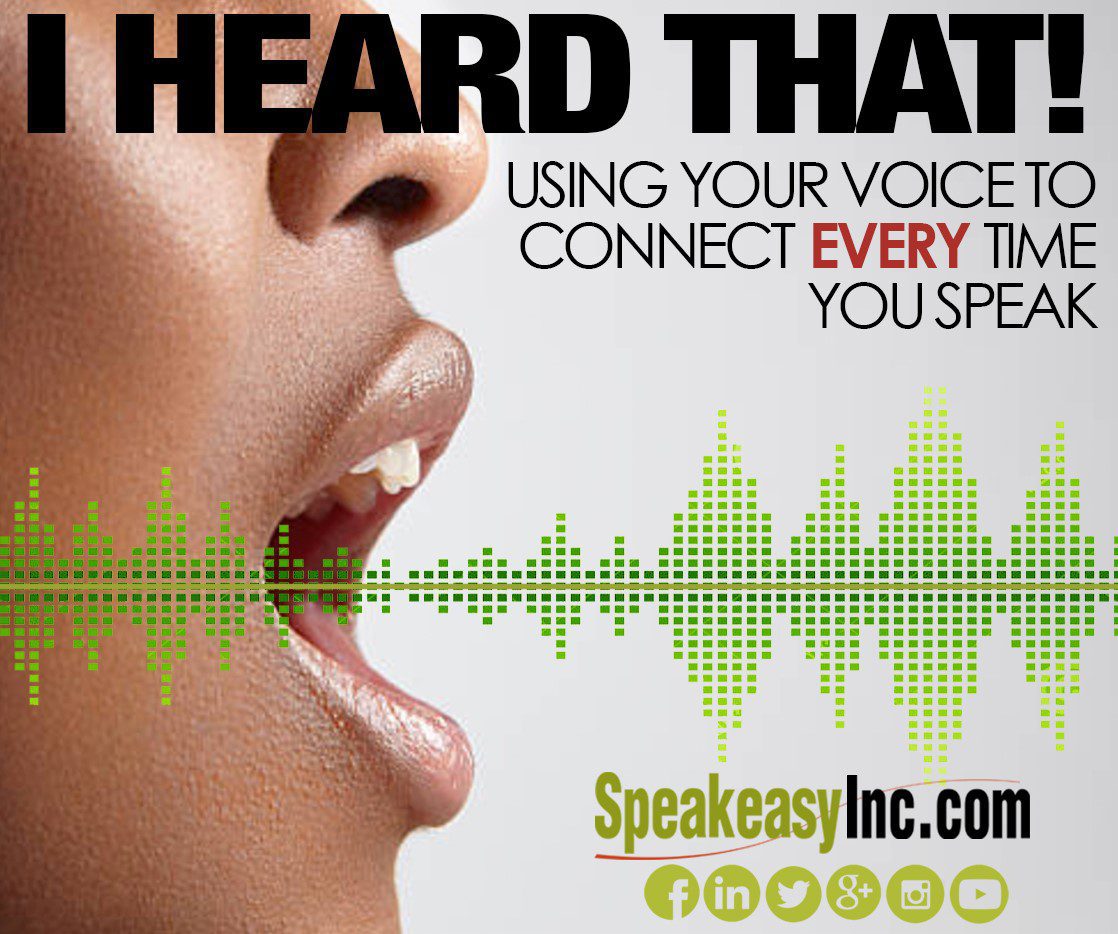
19 Sep Using Your Voice to Connect Every Time You Speak
Reading Time: 3 minutesOur world is becoming more global and thus, more virtual. Technology, as they say, can be a blessing and a curse, especially when it comes to communication. Communicating over the phone, for example, provides us with fewer tools to connect with our audience and make an impact compared to in-person interactions.
So what can you do when all you have is your voice to make a difference? You can be the person your colleagues can’t wait to hang up on, or you can persuade and engage them. Our Speakeasy Faculty interact with hundreds of executives each month. Using a corporate speech-language pathologist lens, here are some common patterns of vocal misuse to avoid:
- The Up Speak: Commonly referred to as the “Valley girl” accent, this vocal style seems to be contagious in California. The speaker who uses it sounds like they’re asking questions rather than giving statements, like they’re not standing behind their own idea. It can occur when a speaker is rambling and using long sentences often connected with “and” or in an effort to sound collaborative and friendly. Don’t be afraid to put a period on the ends of your sentences. It will make you sound confident rather than unsure.
- Vocal fry: While you may not be familiar with the term “fry” I can guarantee you’ve heard it. That harsh voice that sounds like the speaker just woke up or is coming down with a cold. It tends to happen at the ends of sentences, when the speaker is starting to run out of breath and/or if they’re not using their exhale to propel their voice forward. To avoid this raspy, held-back sound, drink plenty of water, open your mouth a bit wider, project your voice and use shorter sentences. The longer the sentence, the more breath you need to support it. Avoiding vocal fry will make you sound more energetic and friendly.
- Mumbling: If you’ve ever been told you mumble or that people can’t understand you, it’s probably because you’re not articulating your words clearly. This is something I notice more frequently in clients who speak English as a 2nd or 3rd. Many people enter my class with the hopes of reducing their accent. This isn’t necessary! Accents make people interesting, unique, even a bit mysterious, BUT the listener must understand every single syllable or they’ll tune you out. How can you make sure you are understood? Over-pronounce your words. Especially those that are multisyllabic (e.g. technology, management, deliverables, operations). Even with an accent, if your words are crisp and clear, you will sound intelligent.
- Talking too fast: As a native New Yorker, this is something I’m always working on. I can talk really fast all day long, but I realized although I might not need to slow down for myself, my audience needs me to slow down or they won’t absorb what I’m saying. Over the phone, my audience can’t read my lips, they don’t have my gestures to help them understand my content. It’s important that I give them time to think. Speaking too quickly also gives the impression that the speaker is anxious or nervous. It can also come across as snippy or aggressive. Make sure you’re talking slowly enough for your audience to take notes on what you’re saying, because most of the time, they are.
- Sounding monotone: There’s nothing worse than listening to someone who sounds boring! You could have the most exciting news, but if you say it with a flat voice, no one will be motivated and energized. The key is to have vocal variety, intonations, ups-and-downs in your vocal tone. “Punch” key words by slightly increasing their pitch and pausing immediately after. This will isolate that word for your audience, telling them it’s more important than the others. It’s your responsibility as the speaker to set the tone. If it’s 7 a.m. on a Monday or 7 p.m. on a Friday, keep in mind the mood and fatigue level of your audience. A voice with energy will keep them alert, a monotone voice will do the opposite.
How can you be sure you’re avoiding these common mistakes? Use your phone! There are free voice memo apps available on all smartphones. Record yourself and ask yourself, am I the person putting everyone to sleep on this conference call? Or, am I demonstrating executive presence, confidence, warmth and passion with my voice? It does not take a Speech Language Pathologist to hear the difference!

